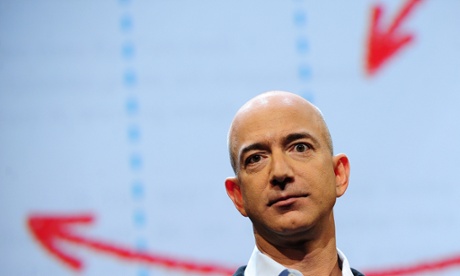
Not all writers are created equal in Jeff Bezos’s Amazon.com-o-sphere.
Bezos may love the written word. He launched his “everything store” by catering to book addicts everywhere, promising nearly-instant gratification of their every bibliomaniacal whim.
But that doesn’t mean that writers, as such, top his list of favorite people.
Or at least, most writers.
Consider the just-announced changes to the Washington Post’s retirement benefits plan.
Bezos bought the venerable newspaper from the Graham family last October, at which time the pension plan was overfunded.
To make sure that it stayed that way – one presumes – the Bezos-run Post will freeze defined-benefit pensions (already nearly as scarce as the dodo or the passenger pigeon) and eliminate retirement medical benefits. They plan to do the same to unionized employees’ retirement benefits in contract negotiations that began earlier this week.
When Bezos first acquired the paper last year, he paid tribute to the firm’s talented journalists in his initial meetings. Some of the moves he has made since – such as the steps to reinforce the paper’s firewall (in my email today: “24-hour sale: a full year of unlimited digital access for as low as just $29!”) will probably help ensure that readers are forced to put a monetary value on what those journalists produce.
But does Bezos value those journalists, in pure economic terms?
Clearly not as much as other writers in his stable.
Last year, about the same time that Bezos was negotiating with the Grahams, Amazon arranged to fly about 80 of the authors that it publishes under its own label, Thomas & Mercer, to a Seattle conference.
Neal Pollack, one of those who attended, recounted in a spirited defense of Amazon that the company wined them and dined them and sent them home with a free Kindle Paperwhite.
Then there is Campfire, a literary weekend that Bezos hosts for premier writers – think Margaret Atwood, Neil Gaiman and Michael Chabon – in Santa Fe, New Mexico.
The events here make the Seattle festivities for Amazon-published authors look like a weekend at a seedy motel in the suburbs of Fort Wayne, Indiana. Horseback riding? Sure, unless you’d prefer to just hang out by the pool. Loot? So much that attendees got small suitcases to carry it all home.
But then, there has always been a sharp distinction between billionaires and their businesses, and billionaires and their passions. This is often visible in media moguls.
Canadian mogul Conrad Black loved the business of newspapers – and before being convicted of fraud in 2007, had built up his own empire, of which the crown jewel was Britain’s Daily Telegraph. Black loved writing, too – and did a lot of it himself, editorializing for his own publications and penning biographies of Franklin D Roosevelt, Richard Nixon and others.
The problem? Despite his love of words, Black wasn’t terribly fond of journalists, describing many of them as “acidulous and misanthropic”.
In fact, Black took to suing many journalists with great gusto, to the point where he told his biographer he viewed the pastime as a profit center.
So we shouldn’t be very surprised if Bezos puts more value on those writers in his stable that belong to him outright, like those that have signed contracts with one of Amazon’s own imprints. He may also put a high price on those that sell millions of books and e-books via Amazon every year, like the novelists who may be published by the likes of Penguin or Simon & Schuster, but still generate lots of revenue for Amazon as well.
Other writers, including journalists, are, right now, a cost center.
What could cause journalists to get more of Bezos’ financial love? Every billionaire has their passion projects, many of which are lavished with more love and at least as much attention as their public ventures receive. Journalism has to become Bezos’ passion.
Bezos has long been on record as being extraordinarily passionate about space travel. That’s why he has spent who-knows-how-much of his own fortune to recover the F-1 rockets that propelled Apollo 11 to the moon from the seabed. He has founded a private firm, Blue Origin, that is working with Nasa and other groups on spaceflight projects and that late last year test-fired a new rocket engine.
What is particularly interesting about Bezos right now isn’t what he chooses to do – or not to do – with his own money. He’s under no obligation to invest heavily to support the retirement benefits of Washington Post reporters – or to refrain from investing in retrieving decades-old Apollo-11 rockets from 14,000 feet underwater.
But the Bezos approach to writers is volatile. In the ongoing battle between Amazon and Hachette, Amazon is attempting to bludgeon Hachette into agreeing to lower its prices for e-books – which writers despise. Bezos also took a tough bargaining stance in the Washington Post negotiations. All of this juxtaposes oddly with Amazon’s sometimes awkward attempts to bypass publishers and cozy up directly to authors, wooing them with goodies.
Amazon already sells about half of all books in the United States, by some calculations. That’s a lot of power, and it can be intimidating to writers already constrained by a fewer number of publishers and outlets of their work.
Already, the rumor is that some writers simply aren’t willing to speak out openly, wary of losing their spot at the top of the “friends of Amazon” camp and falling further down in the hierarchy.
They may be paranoid – or they might be right.

